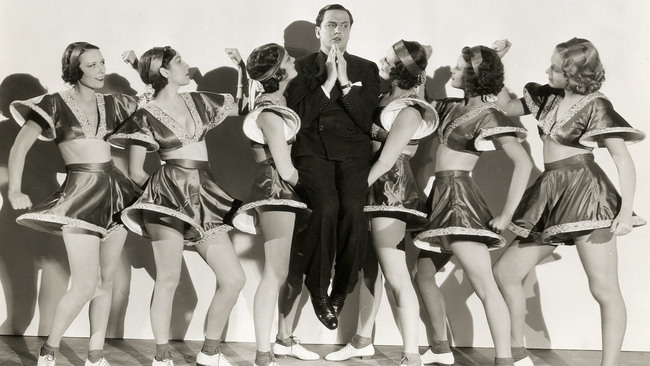Goings On: Restorations, Painting, and More

New York. “It’s Great to Be Alive may not be the nuttiest Hollywood musical of 1933—a year that brought the Marx Brothers’ Duck Soup—but it’s surely the only one to end with a production number in which the women of Cuba, the Netherlands and Czechoslovakia compete for the affections of the last man on earth,” writes J. Hoberman in the New York Times. Alfred Werker’s newly restored feature screens at MoMA tomorrow and on Wednesday, and in between, on Tuesday, MoMA presents J. G. Blystone’s The Last Man on Earth (1924), a film Hoberman finds “less decorous and more suggestive of changing social norms.”
Also on Tuesday, Light Industry presents The Film Sense and the Painting Sense, two back-to-back programs of films by Maya Deren, Stan Brakhage, and Jean Cocteau, among others. As curator Ann Reynolds notes, the evening takes its name from an essay in which critic Parker Tyler (1904–1974) “calls particular attention to how certain filmmakers exploit the formal limits of the camera image’s flat rectangular surface and framing edge in a manner similar to painting to produce images of the moving body that articulate a new space of creative imagination and new ways of seeing, feeling, and being in the world at large.”
“Starting Wednesday, July 12, the Metrograph mounts a rewarding slate of films from the Swiss director Alain Tanner, whose ’70s pictures delighted New York cinephiles by proving, among other things, that self-consciousness and engaging narrative weren’t mutually exclusive,” writes Glenn Kenny in the New York Times.
Also at the Metrograph, and also starting Wednesday: In Chris Marker’s Studio, a series occasioned by the publication of a new book by photographer Adam Bartos, Studio: Remembering Chris Marker. On Friday, Bartos, writer Susan Howe, filmmaker Michael Almereyda, and writer Ben Lerner will take part in a panel discussion.
No Maps on My Taps (1982) and About Tap (1985) are at the Quad through Thursday. “The tap legends in George T. Nierenberg’s jubilant pair of documentaries will make both dance enthusiasts and skeptics see the form in an entirely new light,” write Erica Gold and Tanya Goldman at Screen Slate.
Los Angeles.Dennis Hopper: The Lost Album is an exhibition of photographs on view at Kohn Gallery through September 1. “With his trusty Nikon slung around his neck, Hopper spent his 20s capturing images of 1960s Hollywood, Harlem, Tijuana and Selma, Alabama,” writes Catherine Womack in the LA Weekly. “He knew he was living through a unique time, and he wanted to document it.”
Toronto. Jean-Pierre Melville’s Two Men in Manhattan (1959), screening this evening at the TIFF Bell Lightbox as part of Army of Shadows: The Films of Jean-Pierre Melville, is “an American-set ‘mid-career’ work for the French director that was not so much an international co-production but rather outright fish-out-of-water story,” writes Ethan Vestby at the Film Stage. “The films comes off as somewhat of a noir fantasia in its contrasting of documentary-like hand held shots of New York with baroque interiors shot back in a French studio, which range from Capitol Records to Broadway or even ostensibly modest spaces still art-directed to a high degree.”
Paris. The Cinémathèque française’s Vittorio Cottafavi series runs from Wednesday through July 30.
Marseille. Roger Corman, Mathieu Amalric, Jean-Pierre Léaud, Claire Atherton, Rita Azevedo Gomes, and Éric Baudelaire will be among the filmmakers and cinephiles attending the twenty-eighth edition of the FIDMarseille, opening on Tuesday and running through July 17.
Tokyo. The twenty-sixth edition of Rainbow Reel Tokyo is on through July 17 and, for the Japan Times,Kaori Shoji talks with festival spokesperson Yasushi Higuchi about this year’s highlights.
For news and items of interest throughout the day, every day, follow @CriterionDaily.



